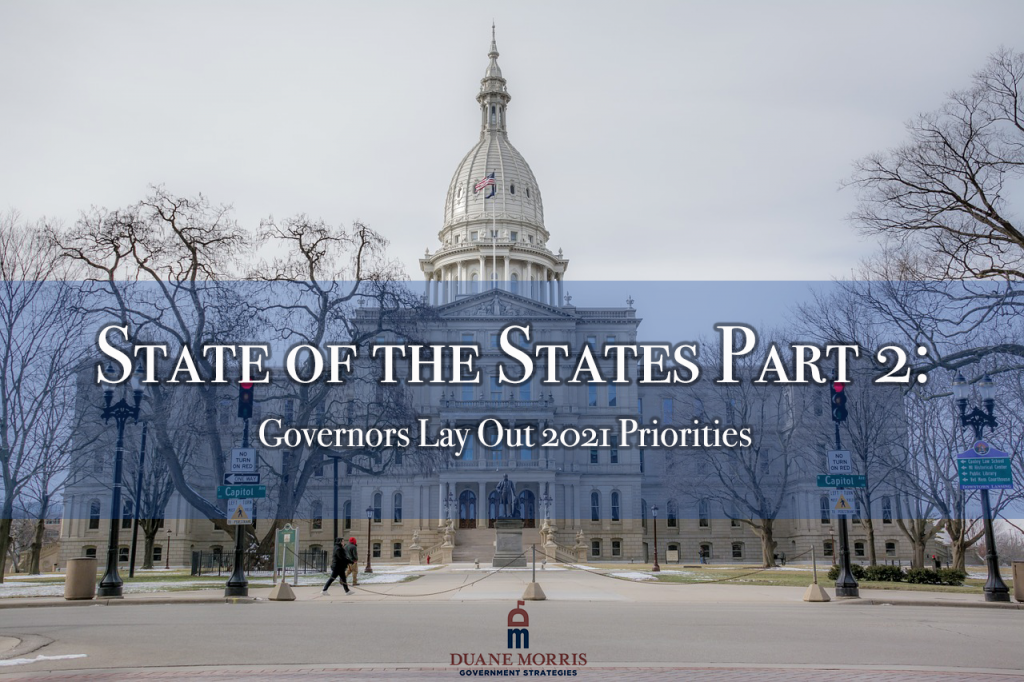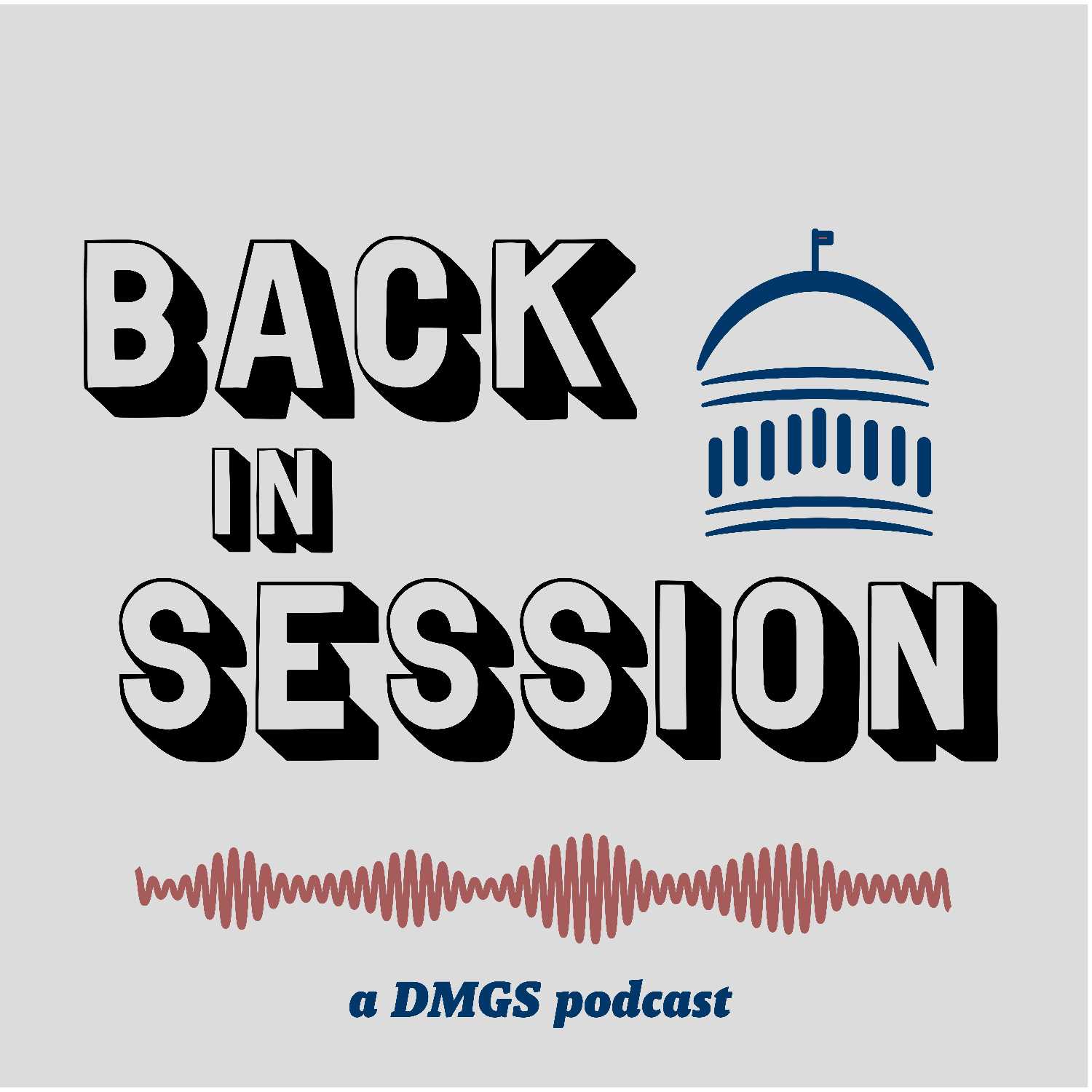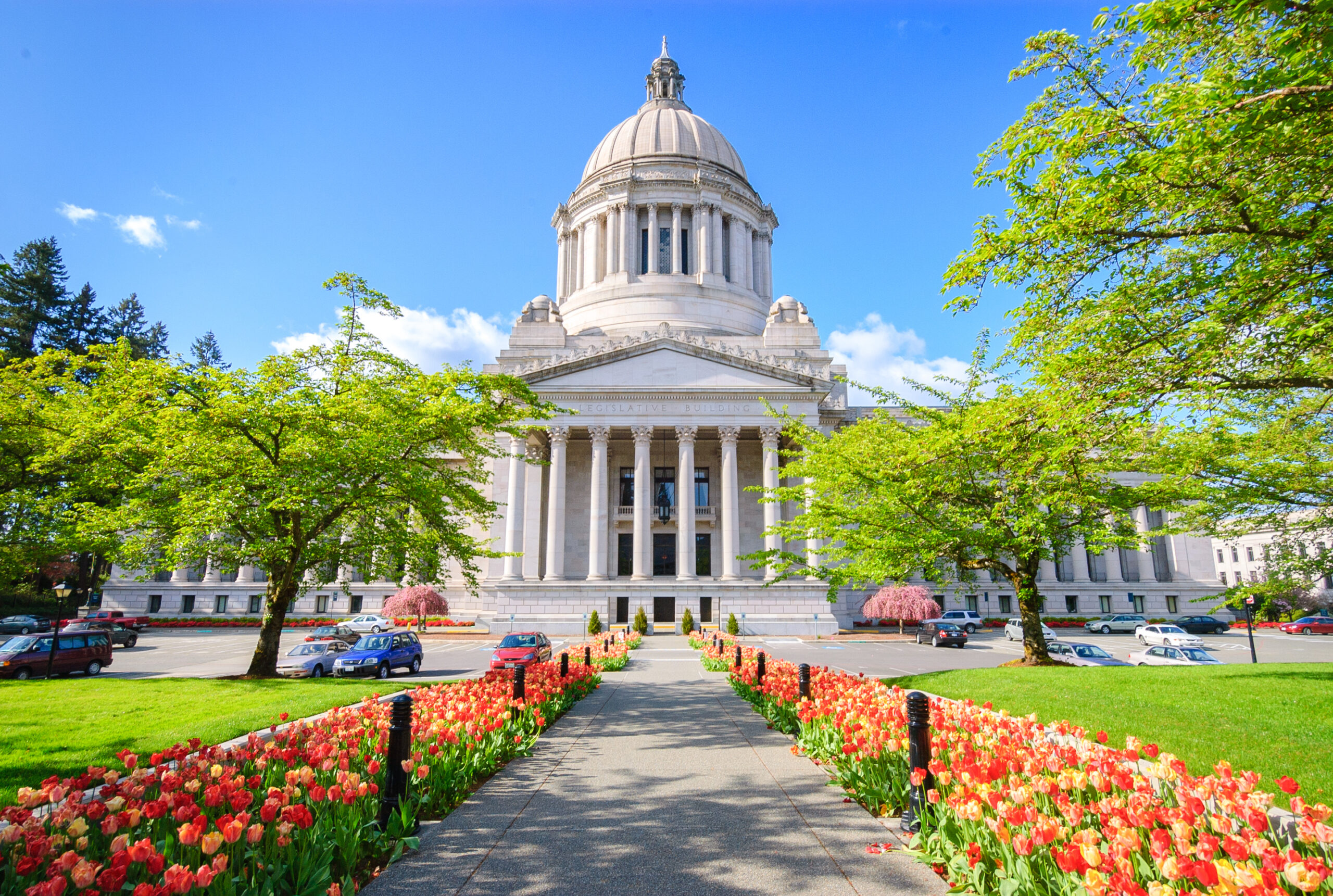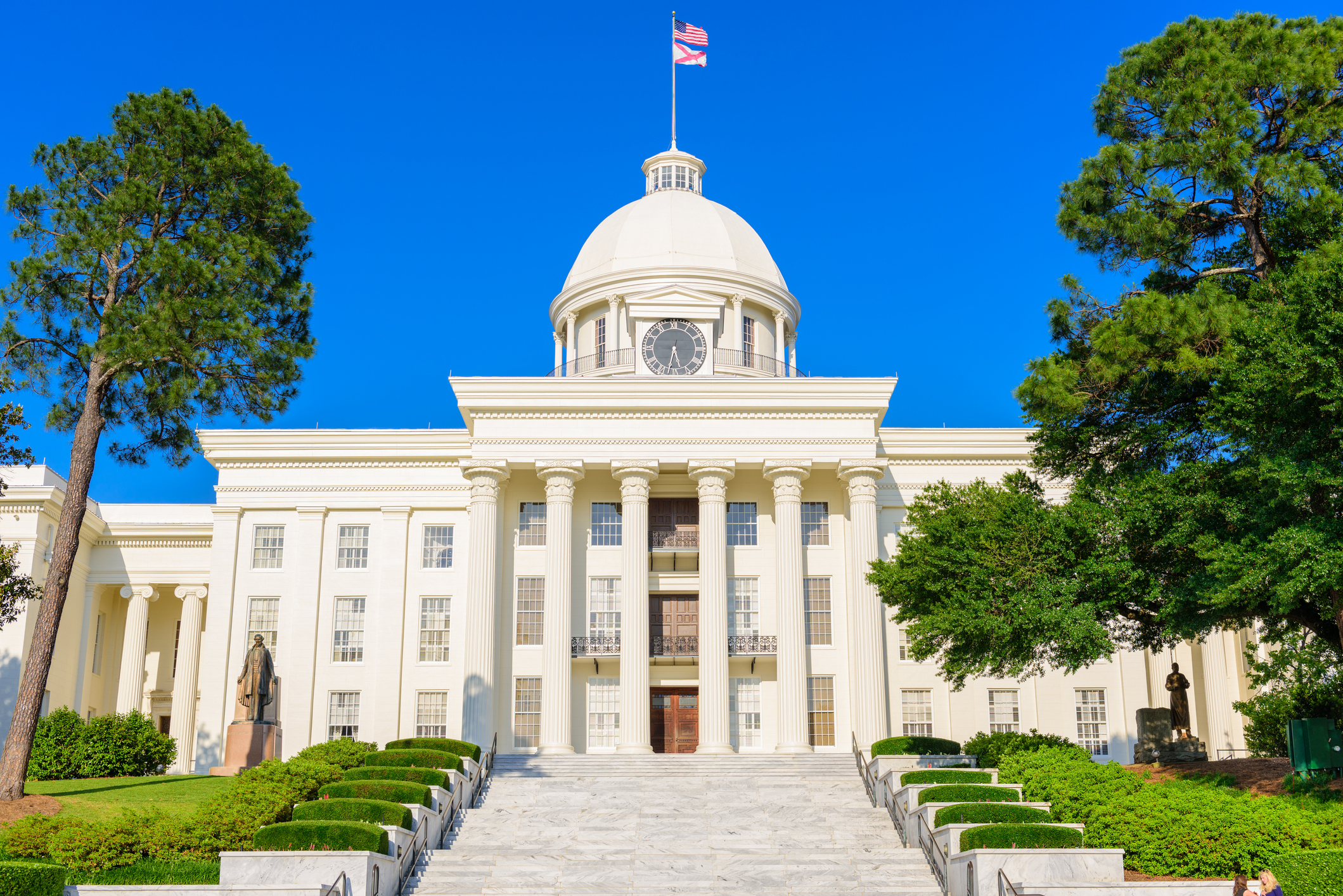
With 2021 legislative sessions underway, governors across the country are delivering their “state of the state” addresses—budget addresses in some states—outlining their visions for their state in 2021. We previously covered addresses by New York, New Jersey, Idaho, Kentucky, Arizona, and Maine governors. Since our last update, more governors have outlined their states’ visions in 2021.
As we mentioned previously, lawmakers must agree with the governor for policies to advance and become law, which largely depends on each state’s partisan makeup. A trifecta, where a political party controls the governor’s office and both chambers of the legislature, often make it easier to advance what governors laid out in their addresses. In a divided government, legislators must make compromises.
Michigan
Governor Gretchen Whitmer delivered her 2021 State of the State address, her third, in late January. Whitmer announced her Michigan Back to Work plan and noted they would announce initiatives and projects throughout the year, from tech, mobility, and manufacturing growth, to clean energy and road construction. Whitmer further highlighted several bipartisan efforts last year, including two bipartisan budgets, the bipartisan Michigan Reconnect Program, and passing the state’s Clean Slate law.
Whitmer outlined the following priorities:
- Michigan COVID Recovery Plan – Whitmer called on lawmakers to pass the Michigan COVID recovery plan focused on distributing vaccines, getting students back on track, supporting small businesses, and jumpstarting the economy. The plan also calls for lawmakers to permanently extend unemployment benefits from 20 weeks to 26 weeks.
- Funding for Local Roads – Whitmer wants lawmakers to collaborate with her to provide localities with more options to fix local roads and bridges following last year’s Rebuilding Michigan Bonding Plan.
- Michigan Classroom Heroes – Whitmer announced the MI Classroom Heroes Grants. The grants are up to $500 for teachers and support staff and help offset some of the expenses and efforts educators have made throughout the COVID-19 pandemic. The grants will go out in February.
- Good Jobs for Michigan – Whitmer called on lawmakers to pass “Good Jobs for Michigan” legislation to keep and grow businesses and create jobs. She noted Pfizer was the first business to use the program, building their sterile drug manufacturing plant and creating 450 good-paying jobs.
- Michigan Clean Water – Whitmer called on lawmakers to pass the MI Clean Water Plan, a $500 million comprehensive water investment in the state’s water infrastructure. Whitmer claims the plan will support over 7,500 jobs.
- Lowering the Cost of Prescription Drugs – Whitmer called on lawmakers to pass legislation that requires transparency, holds accountable those profiting from skyrocketing prescription drug costs, and makes necessary medications affordable for all in the state.
Governor Whitmer also announced the “Fixing the Damn Road Ahead” tour, where she plans to engage with people across the state from all political parties to focus on how to unite, improve how they talk to one another and fix the “damn road” ahead.
Texas
Governor Greg Abbott delivered a 2021 State of the State address on February 1, outlining the year’s priorities. Abbott specifically outlined five emergency items: expanding broadband internet access, punishing local governments that “defund the police,” changing the bail system, ensuring election integrity, and providing civil liability protections for individuals, businesses, and healthcare providers that operated safely during the pandemic.
Abbott noted a desire to collaborate with lawmakers to find a way to navigate a pandemic in the future while also allowing businesses to remain open. Abbott further noted that Texas prides itself on low regulations, and the state continued to cut more regulations to help navigate the pandemic. Specifically, Texas cut regulations to allow restaurants to sell alcohol to-go and allow Texans to easier access their doctors via telemedicine. Abbott asked lawmakers to make these regulatory relief measures permanent.
The governor also outlined in the address a wish to bolster the state’s civics education, further restrict abortions, and make the state a Second Amendment Sanctuary State.
Oklahoma
Oklahoma Governor Kevin Stitt delivered a 2021 State of the State address on February 1. In the address, Stitt focused on the administration’s response to the pandemic, support for schools and teachers, economic growth, and continuing its focus on improving transparency, accountability, and efficiency in state government.
Stitt noted that state House Republicans picked up five more seats in November’s elections, giving the party the strongest supermajority in Oklahoma history. As such, Stitt laid out a conservative agenda that will keep tax revenues low, fund the oil and gas industry, support farmers and ranchers, enact business-friendly policies, restrict access to abortion, and promote Oklahomans’ personal and religious freedoms.
Stitt specifically laid out “The People’s Agenda” for the 2021 legislative session, made up of three main pillars:
- Make Oklahoma a top ten state for business
- Deliver taxpayers more for their money
- Invest in Oklahomans
Stitt also noted the state’s most pressing issue involves the U.S. Supreme Court’s ruling in McGirt v. Oklahoma. Stitt noted the Court ruled the Creek Nation’s reservation was never disestablished for criminal jurisdiction and that state courts lack the authority to prosecute crimes committed by or against Oklahomans who are also tribal members. As a result, hundreds of criminal cases are being dismissed. Further, Stitt noted the ruling raises other unanswered questions, such as whether tribal members must pay income and sales tax. If not, there is a potential tax revenue loss of $200 million a year.
Pennsylvania
Before Governor Tom Wolf’s annual budget address, the Pennsylvania governor outlined a legislative agenda for 2021. Wolf noted the agenda prioritizes ensuring that Pennsylvania businesses and workers can recover from the pandemic. Specifically, Wolf called on lawmakers to address the following issue areas:
Pandemic Recovery
- Wolf called on lawmakers to appropriate $145 million in reserves from the Workers Compensation Security Fund to immediately distribute to businesses harmed by the pandemic.
- Wolf proposed a multi-billion-dollar injection into the workforce development system to provide rapid re-employment assistance to workers impacted by the pandemic and address employment barriers.
- Wolf proposed using the Redevelopment Assistance Capital Program (RACP) to fund hazard remediation to keep students safe when they return to school and close the digital divide amongst students by broadening RACP eligibility criteria to include broadband providers and schools.
- Wolf asked the federal government to increase funding for broadband expansion, flood mitigation, containment remediation, blight, green infrastructure, and transportation projects.
- Wolf called for lawmakers to increase Pennsylvania’s minimum wage to $12/hour with a path to $15/hour.
Build on Bipartisan Progress
- Wolf proposed building on previous efforts to reform the state’s criminal justice system through bail reform, indigent defense funding, expanding the state’s Clean Slate law, probation reform, and other bipartisan policies.
- Wolf proposed building on bipartisan health reform with a plan that focuses on both physical and behavioral health and promoting affordability, accessibility, and value in health care.
- Wolf wants to continue improving the professional licensing process and will continue to examine what licensure barriers still exist and pursue added reforms.
- Wolf again proposed reducing the corporate net income tax from 9.99% to 9.49% on January 1, 2022, and then reducing the tax incrementally to 6.49% by 2026. Wolf also proposed closing the Delaware Loophole and shift to combined reporting to tax corporations as a single entity.
- Wolf proposed legalizing adult-use cannabis.
- Wolf proposed a comprehensive plan to reform Harrisburg.
- Wolf called on legislation to make his gift ban expanded and permanent to all state elected officials are accountable to it. Wolf also called for enacting new campaign finance laws to place limits on contributions to candidates seeking office, implement aggregate limits for races, place restrictions on PACs, and strengthen reporting and disclosure requirements across the board.
- Wolf called for implementing broad “pay to play” provisions requiring the disclosure of campaign contributions made by parties seeking state contracts. The governor also called on requiring public officials to submit receipts for taxpayer-funded expenses, banning lobbyists from campaign work, and more clearly defining the relationships between lawmakers, lobbyists, and political consultants.
- Wolf called on lawmakers to build on recent election reforms by allowing pre-canvassing of ballots before Election Day, allowing same-day voter registration, and strengthening voter intimidation restrictions. Wolf also called on legislation to prohibit firearms in all polling locations.
Wolf’s budget proposal also contains the largest increase in education spending in Pennsylvania, along with an increase in the state’s personal income tax (PIT) rate. The governor is expected to propose changing the PIT from 3.07% to 4.49%, which would mark the first increase since 2003 if lawmakers agree. Estimates show the personal income tax increase would improve revenue by more than $3 billion annually.
Hawaii
In Governor David Ige’s 2021 State of the State address, he recapped Hawaii’s response to the pandemic. Despite the state’s response, Ige projects revenues will not fully recover to pre-pandemic levels until 2024. As a result, Ige noted that the state would have to tighten its belt, and Hawaiians will be asked to do more with less. However, the governor did not delve deeper into how the state will tighten its belt moving forward and did not offer any potential cuts to lessen the deficit.
Hawaii responded financially to the pandemic by reducing the current budget by $402 million, transferring $345 million from the Rainy Day Fund, and eliminating $350 million from state programs. Ige also called for making lands available to build affordable leasehold homes, particularly around the rail line, and investing more in capital improvement projects, which will add infrastructure and roads to help develop more housing.
The governor mentioned that last year lawmakers established the School Facilities Agency to bring the state’s aging school buildings into the 21st century, and the state will move forward on three pilot projects to serve as a model for schools in the future.
While Ige noted there is no silver bullet, the state will have to find ways to revise Hawaii’s economy as quickly as possible. Short term, Hawaii plans to cover the interest payments on the $700 million DLIR loan on behalf of employers, amounting to over $165 million for businesses.
Ige also expressed his belief that the key to reviving the state’s economy is tied to the state’s health and pointed to when the state launched a 14-day quarantine for travelers. While the quarantine was devastating to Hawaii’s tourism industry, it was important in reducing the spread of the virus. Long-term, Ige hopes to diversify the state’s economy, so it is not as dependent on tourism and investing in the digital economy to account for the rise in remote work and digital skills demand.
Moving forward, Ige called for the creation of a program of action to reboot and upgrade the state’s economy: Hawaii 2.0, and intends to convene stakeholders and communities across the state. The program’s goal is to have specific actions for the legislature to act upon in the 2022 session.
Ige did mention the legislative package for this year includes a bill to create a Broadband and Digital Equity Office.
Massachusetts
Governor Charlie Baker delivered a 2021 State of the Commonwealth address last week. In the address, Baker recapped the state’s pandemic response and particularly mentioned the Commonwealth’s Small Business Relief Program, the largest in the country, which gave small businesses over $700 million.
Baker noted that lawmakers overcame difficult operational challenges to enact a wide range of critical legislation. He pointed to extending tax filing and payment dates on several occasions, funded essential state and local services without raising taxes or fees, and enacting legislation on transportation, economic development, housing, health care, and police reform. Specifically related to police reform, Massachusetts passed a new law banning chokeholds, limits no-knock warrants, and creating a new independent state entity to establish policing standards, certify law enforcement officers, investigate allegations of misconduct, and suspend or revoke certification.
Baker also mentioned that in recent weeks, they put forward a science-based roadmap to reach net-zero emissions by 2050 and noted the Commonwealth had invested over $935 million in climate change mitigation and adaptation since he took office. Baker said Massachusetts is on track to invest $1 billion in climate action by next year.
Moving forward, Baker hopes to collaborate with lawmakers on issues related to environmental justice, transportation, resiliency, conservation, and energy efficiency.
Baker also filed his administration’s FY 2022 budget recommendation last week, a $45.6 billion proposal.
Latest News
As legislative sessions kick off across the country, advocacy professionals must navigate diverse political landscapes, shifting priorities, and fast-moving policy developments. In this episode of Back in Session, hosts Ryan Stevens and Ryan DeMara sit [...]
Photo credit: iStock.com/hapabapa As the year draws to a close, state legislatures across the country are gearing up for their upcoming sessions in 2025. A critical aspect of this preparation is state legislative prefiling, a [...]
Photo credit: iStock.com/zrfphoto In the State of Washington, members of the General Assembly can pre-file legislation in the month before a legislative session begins. Beginning on December 4, 2023, lawmakers began pre-filing dozens of bills. [...]
Photo credit: iStock.com/SeanPavonePhoto On December 1, 2023, Alabama state lawmakers began pre-file legislation for the 2024 session, when their bills will receive an official introduction. In total, 35 bills have been pre-filed (30 in the [...]






Stay In Touch